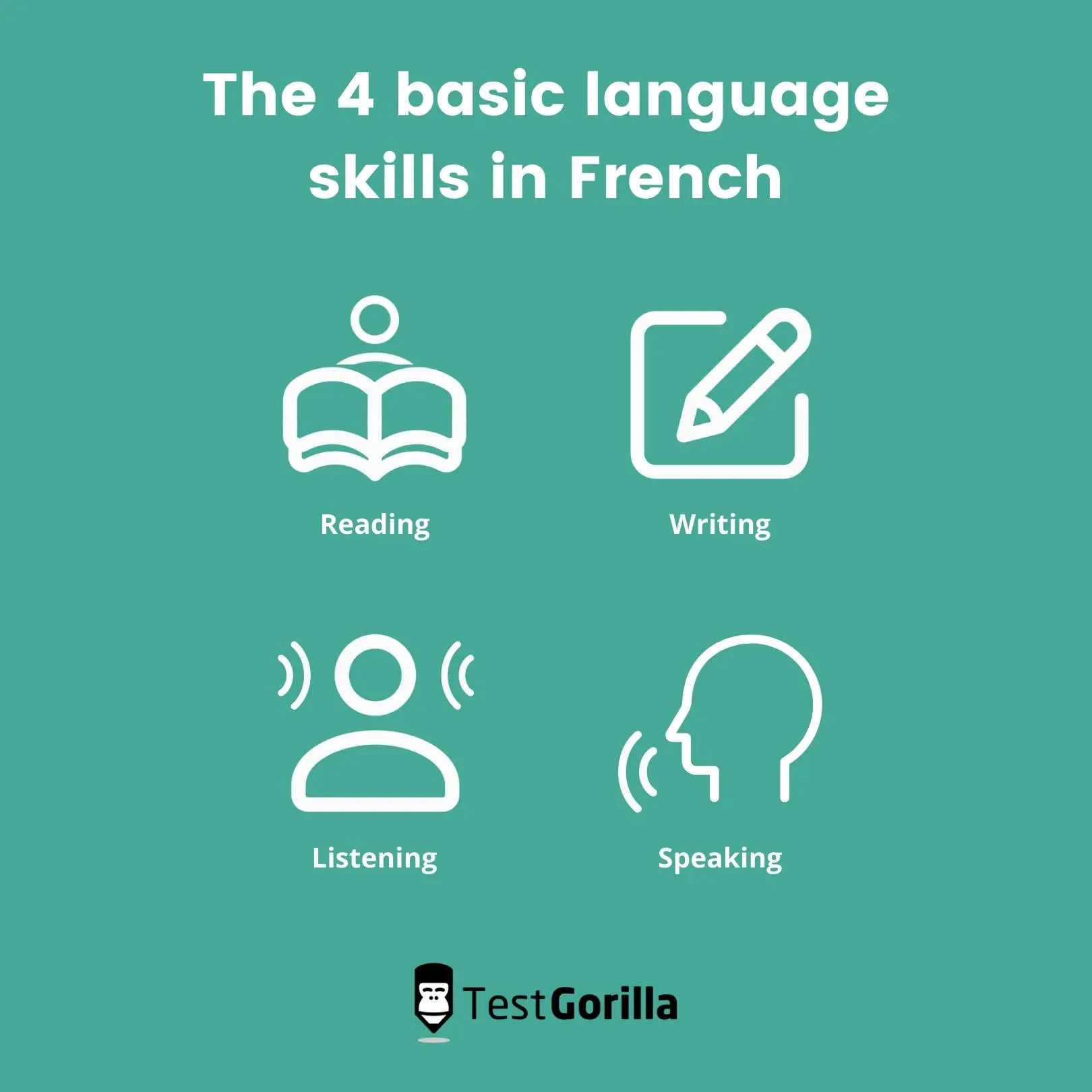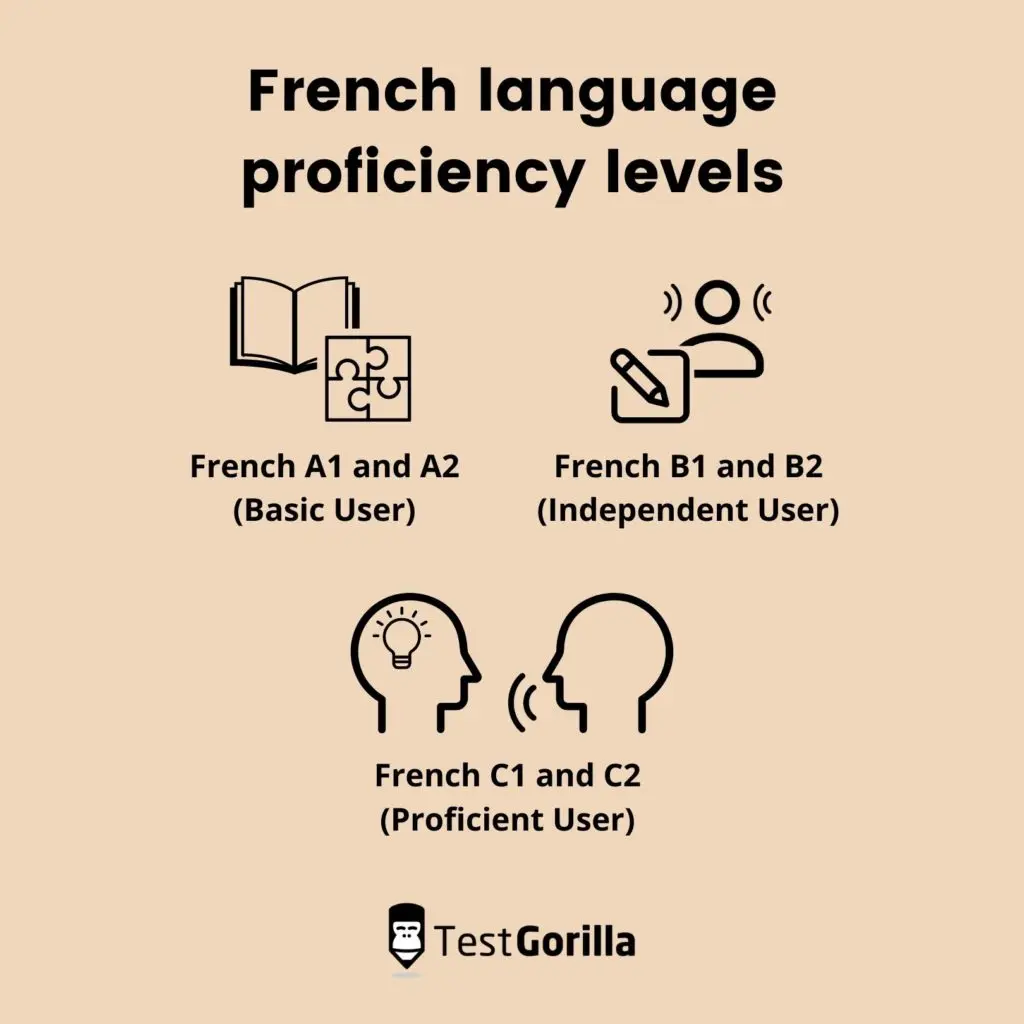There is a growing demand for bilingual talent in the global economy as more businesses require workers who can serve customers in multiple languages.
Besides English, French is the only language spoken on all five continents. It is an official language in many international organizations, from the European Union to the Olympics Committee to the UN.
French fluency is in high demand, but how do you conclusively test for it when hiring before candidates reach the interview stage?
The good news is that proficiency in French is a practical skill you can easily assess with language proficiency tests.
In this article, we’ll cover the four core language skills in French, the standard for French proficiency levels, and how to assess French fluency quickly using language proficiency tests.
Table of contents
The 4 basic language skills in French
Someone who is fluent in French has mastered four basic skills: reading, writing, listening, and speaking.
Depending on the role you’re hiring for, some skills may be more important than others. Let’s break each one down.
1. Reading
Reading is a necessary skill for understanding French texts of varying levels of complexity. It’s a must-have skill if the open role in your organization requires someone who can read contracts, guides, manuals, emails, or other written correspondence.
How to test
Reading is an easy skill to test. Simply have the candidate read a text followed by multiple-choice questions that assess their understanding. TestGorilla has a French language test designed to assess reading comprehension.
2. Writing
Writing is an essential skill if the role requires someone who can respond to emails or messages and write presentations and other materials. It’s a skill that requires at least an intermediate level of fluency.
How to test
You can check a candidate’s French writing skills by assessing their knowledge of basic grammar and sentence composition. TestGorilla’s French (intermediate/B1) test has a dedicated section for evaluating that type of knowledge.
3. Listening
Listening skills refer to the ability to understand spoken French in phone conversations, meetings, presentations, Zoom calls, and more. Depending on the level of proficiency you require, you may want to test whether candidates can comfortably understand complex topics in French.
How to test
You can test an applicant’s listening comprehension skills using TestGorilla’s upper-intermediate-level or advanced-level French fluency tests. Both tests have sections designed to assess French listening skills.
4. Speaking
Speaking is a necessary skill if the candidate must participate in conversations with clients, coworkers, and managers. Candidates should ideally be able to express themselves clearly and communicate spontaneously.
How to test
You have to hear applicants speak to properly assess their speaking skills. Once a candidate passes one of TestGorilla’s French proficiency tests, conduct a phone or video interview to assess their French speaking skills.
French language proficiency levels: Which one are you testing for?
A person’s French proficiency level determines how fluent they are in the language.
The Council of Europe has designed a framework for measuring language proficiency levels called the Common European Framework of Reference for Languages (CEFR).
The CEFR assesses foreign language proficiency and is a basis for recognizing language qualifications. It organizes language proficiency into six levels: A1, A2, B1, B2, C1, and C2.
A1 represents a beginner who can understand and use basic phrases and expressions, while C2 represents a proficient candidate who can easily understand virtually everything.
The CEFR scale can be broken down into three categories when testing for French language proficiency:
French A1 and A2 (Basic User): Speaks very basic French and can comfortably introduce themselves, ask for directions, or order food in a restaurant.
French B1 and B2 (Independent User): Can communicate on many topics and read and write using a wide range of French vocabulary.
French C1 and C2 (Proficient User): Can communicate fluently and spontaneously, as well as read and write long, detailed texts on complex topics.
B2 level should be sufficient for most jobs. However, a technical role dealing with complicated topics may require a C1 or C2 level of proficiency.
How to test for French fluency
Language proficiency tests are the best way to assess French fluency. The CEFR framework provides an empirical basis for recognizing candidates’ French language skills. You can use it to choose a fluency level that best fits the role’s requirements.
TestGorilla offers three French language proficiency tests that follow the CERF framework:
French (intermediate/B1) test: Designed for sales representatives, support agents, and other employees who need an intermediate level of French for their role.
French (upper-intermediate/B2) test: Designed for customer success managers, sales reps, account managers, product managers, and any other roles that require an upper-intermediate level of French fluency.
French (proficient/C1) test: Designed for content creators, writers, editors, and other employees who need a high level of French fluency for their job.
Quickly assess French fluency using language proficiency tests
Skills-based hiring is gaining traction globally as companies modernize their hiring practices to stay competitive. Hiring managers in many large corporations are now emphasizing candidates’ technical skills over degrees.
French fluency is a good example of a skill you can easily assess using pre-employment testing. TestGorilla’s French language proficiency tests cover grammar, sentence composition, reading comprehension, and listening comprehension.
TestGorilla’s language tests are made by subject-matter experts and are tested on hundreds of test takers before they’re published. A test can also be tailored with questions that fit a specific role.
Sign up today to get started for free and enjoy efficient, bias-free decision-making when hiring workers with French fluency.
Related posts
Hire the best candidates with TestGorilla
Create pre-employment assessments in minutes to screen candidates, save time, and hire the best talent.
Latest posts
The best advice in pre-employment testing, in your inbox.
No spam. Unsubscribe at any time.

Hire the best. No bias. No stress.
Our screening tests identify the best candidates and make your hiring decisions faster, easier, and bias-free.
Free resources
This checklist covers key features you should look for when choosing a skills testing platform
This resource will help you develop an onboarding checklist for new hires.
How to assess your candidates' attention to detail.
Learn how to get human resources certified through HRCI or SHRM.
Learn how you can improve the level of talent at your company.
Learn how CapitalT reduced hiring bias with online skills assessments.
Learn how to make the resume process more efficient and more effective.
Improve your hiring strategy with these 7 critical recruitment metrics.
Learn how Sukhi decreased time spent reviewing resumes by 83%!
Hire more efficiently with these hacks that 99% of recruiters aren't using.
Make a business case for diversity and inclusion initiatives with this data.



















